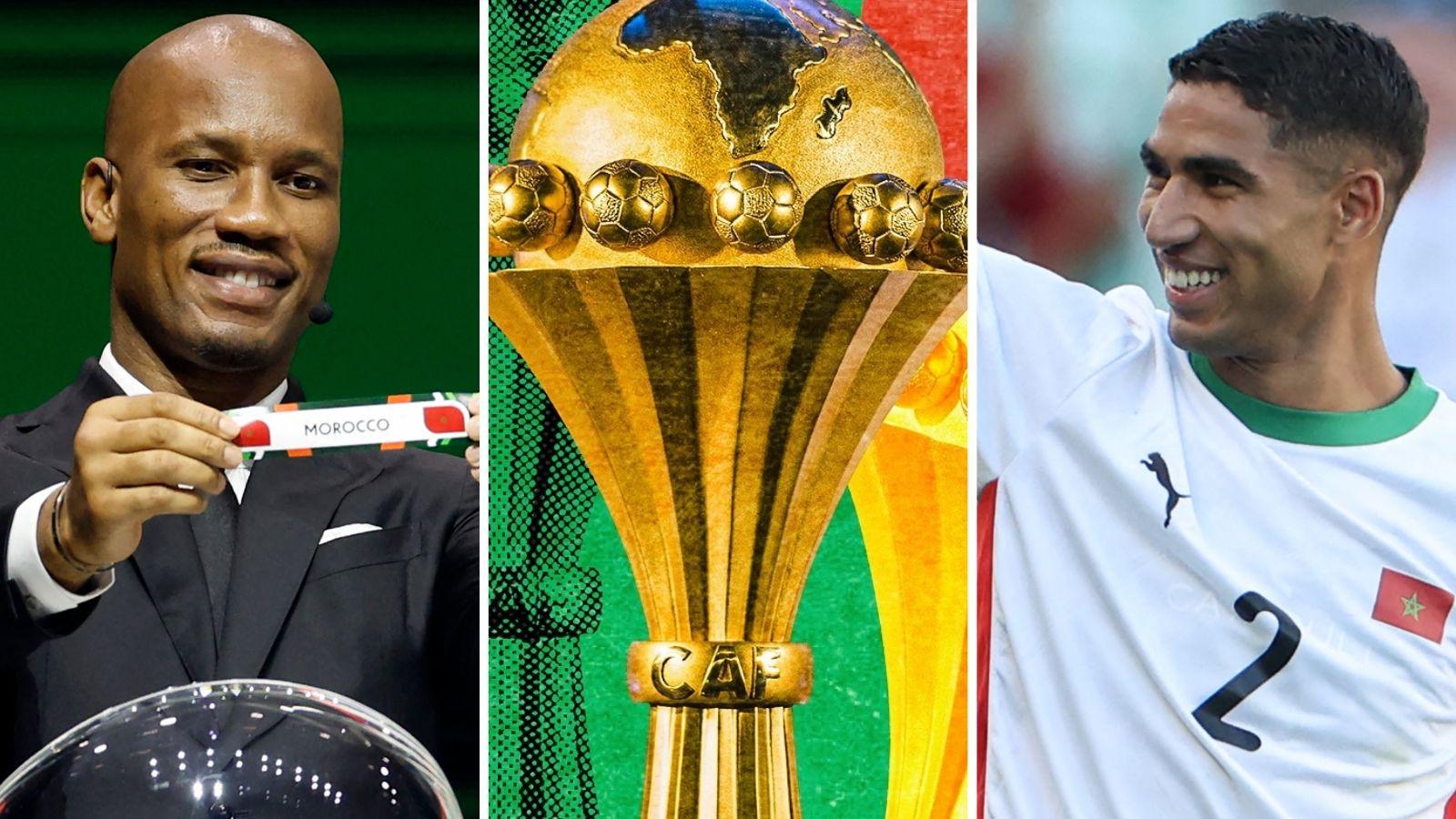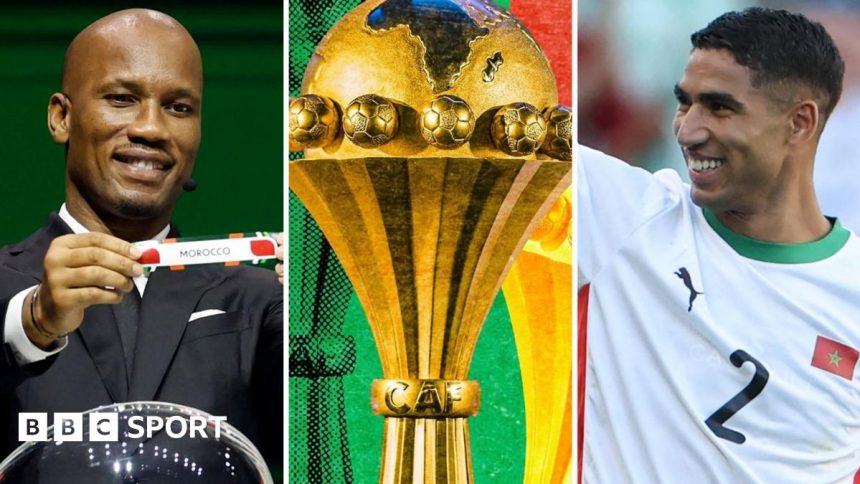What can we expect at Afcon 2025 with one year to go?

The group draw for the 2025 Africa Cup of Nations will be in late January, with Achraf Hakimi hoping to help Morocco lift the trophy on home soil
-
Published
Saturday marks one year to go until the 2025 Africa Cup of Nations (Afcon) kicks off.
Morocco will welcome Africa for the second time, having previously hosted in 1988.
Qualifying was completed in November but several questions about the continent’s biggest sporting event remain unanswered.
BBC Sport Africa runs down what we do and do not know about next year’s feast of football.
When is Afcon 2025?
The timing of the biennial competition has shifted once again, with the congested club and international calendars creating a “scheduling nightmare” for organisers the Confederation of African Football (Caf).
The past two editions were played in January and February and a commitment made in 2017 to stage Afcon mid-year has again been overlooked.
The 2025 Afcon will begin on 21 December next year and run until 18 January 2026.
It will be the first time that the tournament is held over the Christmas and New Year period – something that could yet prove problematic.
The fixture schedule has not been announced, so there is still the potential for games to be played on Christmas Day. The first round of group action at the 2023 tournament was spread across five days.
When will players be released?
Cameroon goalkeeper Andre Onana could miss several Manchester United fixtures depending on his commitments at Afcon with the Indomitable Lions
Always a topic of debate, the date for clubs to release players is yet to be determined because Afcon 2025 falls outside previously agreed Fifa windows for internationals.
The European Club Association, which represents more than 700 professional teams on the continent, will no doubt be involved in negotiations, given many African stars ply their trade in Europe’s top leagues.
Some players could come to unique agreements between club and country.
But Andre Onana’s decision to play for Manchester United in the Premier League just 24 hours before Cameroon’s first game at Afcon 2023 backfired when the goalkeeper was benched by the Indomitable Lions despite arriving, via private jet, in time for kick-off.
Warm-up games were held from eight days before the 2023 finals, but whether teams participating next year will have a full squad at that point remains to be seen.
-
-
Published28 December 2023
-
What is the format and when is the draw?
Sadio Mane’s Senegal and Nigeria are both expected to be among the top seeds at Afcon 2025
The format in Morocco remains the same as the past three tournaments, with the 24 teams drawn into six groups of four.
The top two in each group advance to the round of 16 along with the four best-ranked third-placed sides. The competition is a straight knockout from that point on.
Before the draw – which will be held on 27 January in Rabat – countries will be placed into one of four pots based on their position in the Fifa world rankings.
Things could be complicated should defending champions Ivory Coast not be ranked among Africa’s top six teams.
There is a possibility that the Elephants would be put into pot one anyway, relegating a better-ranked nation to pot two.
In the most recent rankings Ivory Coast were the continent’s sixth-best side, but were only three places ahead of Cameroon.
Where will Afcon 2025 matches be held?
Games at the 2023 tournament in Ivory Coast were played in six different stadiums spread across five cities, with all venues having a minimum capacity of 20,000.
The same requirements are in place for Afcon 2025. Although the Royal Moroccan Football Federation has not made an official announcement it is not short options, given the country boasts arguably the best footballing infrastructure on the continent.
A 115,000-capacity stadium is being constructed on the eastern outskirts of Casablanca for when the country co-hosts the 2030 World Cup, but this will not be ready before Afcon kicks off.
The Stade Mohammed V in Casablanca staged the 1988 final but Tangier’s Ibn Batouta Stadium now has the highest capacity in the country.
The Prince Moulay Stadium in Rabat was used at the Women’s Africa Cup of Nations in 2022 and Agadir, Fez and Marrakesh are also front-runners to be handed games.
Who are the favourites?
Ivory Coast will defend the trophy after winning their third continental title on home soil in February
One of the wonders of Afcon is its sheer unpredictability.
The past eight editions have provided seven different champions, with Ivory Coast the only nation to lift the trophy twice since 2010.
Morocco have been the top-ranked side in Africa since their historic run to the semi-finals of the 2022 World Cup in Qatar, and pressure is building to end what will be a 49-year wait for their second continental title.
The Atlas Lions put in dominant performances in qualifying, scoring 26 goals and conceding just twice, to finish with the only 100% record.
But hosting the tournament is not necessarily an advantage. Only Tunisia, Egypt and the Ivorians have triumphed on home soil this century.
Nigeria will be looking to go one better after finishing as runners-up earlier this year while Senegal and Egypt will be heavily fancied.
Were there any surprise qualifiers?
There will not be any Nations Cup debutants, but Comoros and Botswana will both make just their second appearances.
Sudan pulled off a remarkable feat to qualify in the midst of a civil war, eliminating four-time champions Ghana along the way.
Uganda, who will co-host the 2027 tournament, and Benin are involved for the first time since 2019.
Seventeen sides from the 2023 edition return and there are a record seven qualifiers from the Southern African region.
Who will be the top players?
Morocco’s Brahim Diaz was top scorer in qualifying (left) while Egypt captain Mohamed Salah and Nigeria forward Ademola Lookman have been in fine form for their club sides
This is hard to predict – but barring injuries or loss of form over the next 12 months, newly crowned African footballer of the year Ademola Lookman will lead Nigeria’s charge given his stellar performances for Atalanta.
Mohamed Salah is putting in impressive displays for Liverpool this season and the Egypt captain will be determined to win his first Afcon and end the Pharaohs’ 15-year wait for the trophy.
Meanwhile, Real Madrid forward Brahim Diaz was the top scorer in qualifying with seven goals for Morocco.
Yet some of the top performers in Ivory Coast earlier this year were surprises, as Equatorial Guinea’s Emilio Nsue won the golden boot, Nigeria defender William Troost-Ekong was named best player and South Africa goalkeeper Ronwen Williams outshone European-based rivals to take home the golden glove.
Afcon 2025 qualified teams
Morocco (hosts), Algeria, Angola, Benin, Botswana, Burkina Faso, Cameroon, Comoros, DR Congo, Egypt, Equatorial Guinea, Gabon, Ivory Coast, Nigeria, Mali, Mozambique, Senegal, South Africa, Sudan, Tanzania, Tunisia, Uganda, Zambia, Zimbabwe.






